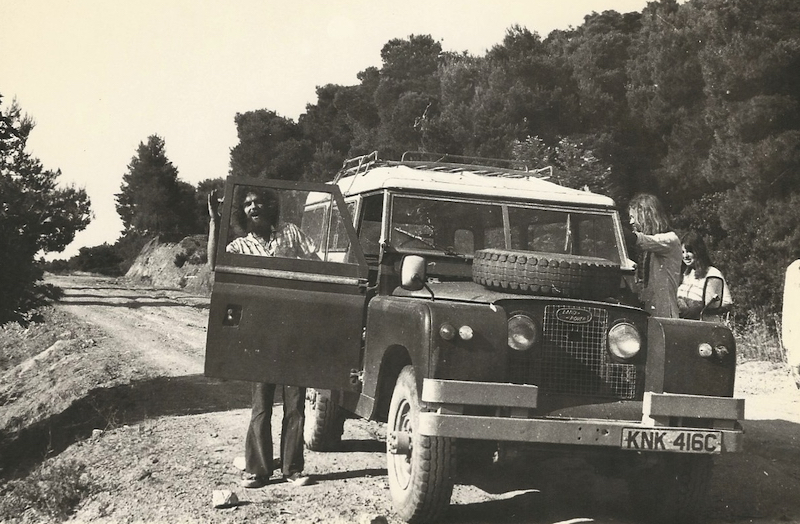
<Back to contents> <Next chapter>
2 - ARRIVAL
It was in my second year on Skiathos that I bought the piece of land in Zorbathes Valley that has become my home, although, at the time, I didn't’t realise just how strong an attachment I would have to it and Skiathos. I bought it with two American friends who were subsequently busted for possession of marijuana and never enjoyed Zorbathes and the hopes and dreams that they had had for living here. I had met them the first day I arrived on Skiathos and shared a meal in the tiny kalivi that they then inhabited in the back of the Kolios Valley. However, I had already had their names on a piece of paper that was given to me by a German girl in Freiburg who was the first person to ever mention the name “Skiathos” to me. In retrospect, fate (or the Greek Gods) was making sure that I came to Skiathos.
It began like this.
I left Britain in the autumn of 1971 with enough money (inherited from a Great
Aunt) to achieve an old ambition of mine, which was to travel around the world.
I left behind me a cloud of hash smoke, a haze of LSD and a lot of friends and
acquaintances with whom I had been sharing the hippie life for several years.
I inevitably went straight to Amsterdam, which was, and still is, my favourite
city, and purchased an old, beat up, Volkswagen van to travel in. As often happened
in Amsterdam, I stayed longer than I had intended to and I didn't leave until
late February 1972 after experiencing one of the coldest winters I can remember.
I had been living in a “Kraakhuis” (Dutch for “Squat”
which is English for an abandoned house that was used by hippies and others
to live in). We had only boards over the windows and the wind blew a freezing
chill in through the cracks.
Living with me was Annette, a Dutch girl who I thought I was in love with. She
almost certainly liked me a lot but was not as “romantic” as I was
about our relationship. It went awry, as these things tend to do when the flow
of love (or what is thought to be love) is mostly one sided, and we split up
fairly amicably.
I left the house with some relief and stayed with my old friends Chris and Rose
in the Jordaan area before setting out to get some sunshine. Not really knowing
where I was going, I headed for Freiburg to see Mike, a German guy I had met
the year before via George, an American friend who had stayed with me for some
time in Hounslow, England. In the course of my stay here Mike took me to a party
where a German girl called Gabi asked me what I was doing and where I was going.
Actually I didn't know the answer to either of these questions as I was in the
situation of being a free man with a reasonable amount on money, no emotional
ties to anything or anyone and the only real thing on my mind was to find somewhere
warm to soak the cold of the Kraakhuis (and my failed love affair) out of my
bones. Anyway, I told her most of this and said that maybe I would go to Spain
(but I had already been there a couple of years before), maybe Corsica (it sounded
fairly exotic), but probably Greece, as I fancied going on to India and then
down to Australia and eventually around the world. She said that if I was going
to go to Greece, I should go to Skiathos as it was a beautiful island and there
were some good people living there. She might well have said Timbuktu and I
would probably have said yes, but Skiathos it was. She wrote down a list of
names of people living there. All of these people became very important in my
life and all that happened to me afterwards on the island, but I did not know
that at the time.
Perhaps I should digress here a little bit and describe myself. I was 23 and
had been a traveler and hippie for the previous 3 years. I had (used to have!)
lots of curly hair; a beard and a moustache and you couldn't’t see much
of my face except my eyes! This is the little signature doodle I used to add
to my letters:
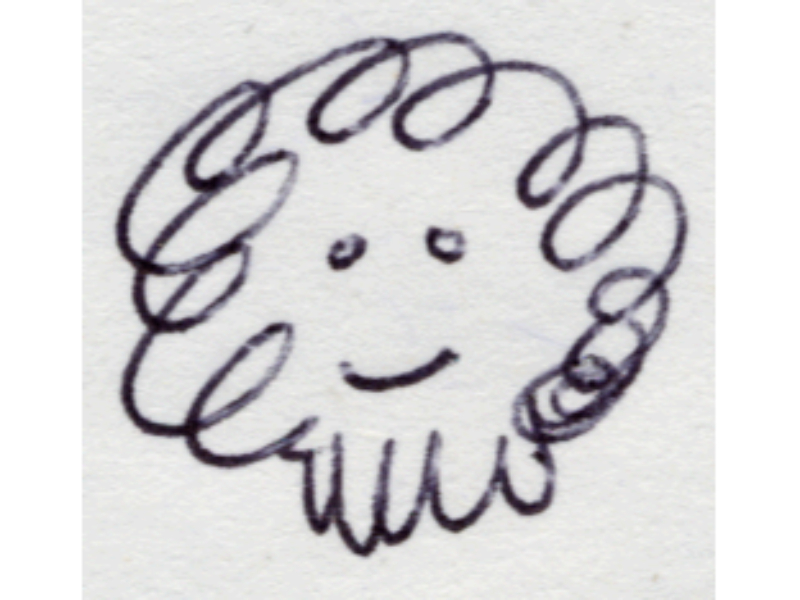
and here’s a photograph:
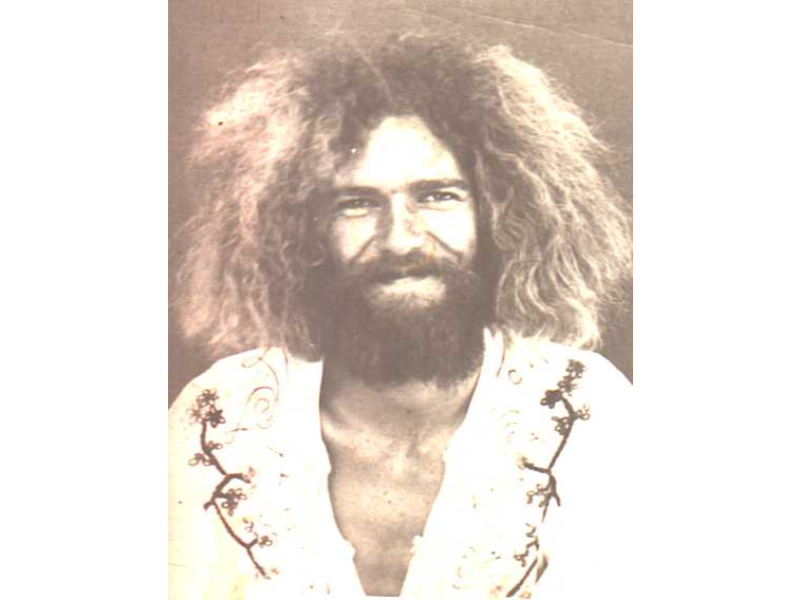
I left Freiburg a couple of days later and had an eventful trip down through
Austria and Yugoslavia (then a backward but reasonably safe place). I picked
up hitchhikers all the way down to pass the time and repay my debts from my
old hitchhiking days. On 6th March 1972, I arrived at the Greek border and drove
down to Volos.
The following day I took a ferry to Skiathos. Upon arrival, my old camper van
must have sensed more than I did about the island as its battery had gone flat
on the ferry and it (and I) had to be pushed down the unloading ramp. The van
must have known that one day it would die here (which it did), I wonder if it
knew more, and saw my fate too? I found Yanni, who was a taxi driver and whose
name I had from Gabi, and he recharged my battery. Whilst waiting for my battery
to charge, I had noted a group of longhaired foreigners sitting at a kafenion,
who subsequently drove off in an old VW coupe.
That afternoon I was sitting in the bank waiting to change some travelers cheques
(it took seemingly massive amounts of paperwork and many signatures including
the bank manager’s) when Keith, one of the longhairs, came in and asked
the manager if he had left his car keys there as he had mislaid them. No one
had seen them, but I said that if he had no luck finding them, I would be quite
happy to give him a lift wherever he needed to go to. He said he would be back
soon and shortly returned to take me up on my offer. I drove him halfway along
the island and parked on the main road at Kolios and he then asked where I was
staying (I had not the faintest idea) and would I like to share a meal with
him and his lady as thanks for giving him the lift. Of course I accepted and
we trudged through a boggy field to his kalivi. A kalivi is usually a one room
stone cottage, often built half off the ground so that the mule or donkey and
goats could be stabled underneath, with a small hearth in the corner for cooking
and warmth. Here I met Paula, his lady, who was cooking a stew over a wood fire
in the corner fireplace of a room not much bigger than some people’s walk-in
closets.
This is how I met the couple with whom I bought Zorbathes and who were among
those on Gabi’s list.
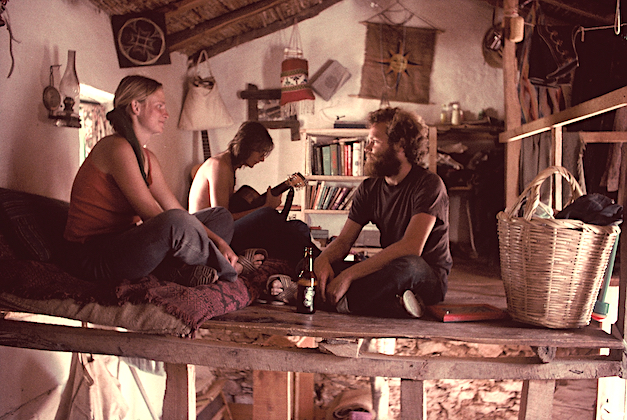
Keith & Paula in their kalivi.
I showed them the list and they remembered Gabi as the girl that had stayed
with Jim, an Englishman, the summer before. They also gave me a quick run down
on the other people mentioned on her list; Reese and Patty, an American couple,
and Franz (a South African giant who Keith was helping to build some tourist
accommodation at Vasilias). We had a wonderful, if simple, meal and I found
myself liking immensely the couple and the romantic life style they lived, which
was completely removed from anything I had ever experienced. Afterwards we talked
about traveling and Keith told of his adventures in India, where he had lost
so much weight from dysentery, that when Paula had met him at Athens airport,
she had not recognised him. Keith suggested that I should drive the van to the
beach of Vasilias (there was a narrow dirt track down from the main road) as
I could park and camp next to the sea and it was reasonably near the only town,
Skiathos. I left them quite late that night having sampled retsina and ouzo
and staggered back in pitch darkness to my van. Until that night, I had never
been in total darkness (there had always been street lights or something to
light my way) and I had to cure myself of my childhood fear of the dark or stay
out all night. Someone had once told me that there was nothing “out there”
in the dark that hadn't been there in daylight so what was there to fear. I
repeated this to myself as I made my way to the van and realised, as I got there,
that in fact, it was true, and the fear was in me and not outside. The first
lesson that Skiathos taught me.
I drove the next morning to Vasilias Beach and, once we were down the dirt track,
the van immediately refused to start again and I found that I was going to be
there for a while, or at least until I could fix the starter motor. Being an
engineering idiot at the time (and I am not much better now) it looked like
I would have to get someone out there to fix it. The place was beautiful, being
just 10 metres from the sea andI was parked under the shade of a pretty old,
if not ancient, olive tree. The sun was still not very strong, it was March
after all, but it seemed like balm to me and I spent some time just sitting
around soaking up the warmth and the light (which is so special in Greece).
It then proceeded to rain for 2 days, which was pretty miserable, but then the
sun returned, and it became glorious. Everything smelt so fresh and the first
spring flowers started to push their way through the earth. I was fascinated
by the old olive tree whose trunk was so gnarled and twisted that I found myself
studying it for hours at a time. Little did I realise that my soul was being
captured by the magic of Greece and this particular island.
It turned out that the apartments Franz was building, with Keith’s help,
were just a short walk up a steep track above Vasilias Beach and I would often
nip up for a cup of tea and a game of cards in Keith’s lunch break.
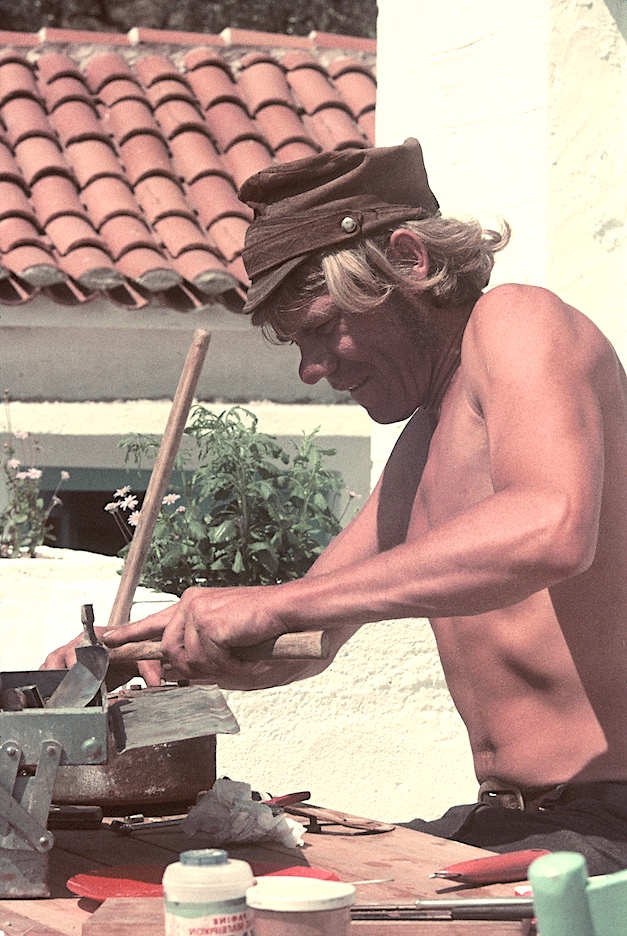
Franz making sandals
Franz was in Athens buying furniture and Pam, his then English lady friend,
asked me after a couple of days whether I wouldn't rather stay up in one of
the apartments and help with some of the work and keep an eye on them when she
and Franz were away. Pam surprised me by telling me she thought I was the most
“together” person around, with my ready smile and friendliness to
nearly all I met. I was still a pretty shy guy at that point and didn't have
much self respect or self confidence. Pam’s comment started me on the
road to discovering who I was and accepting myself as such.
I must explain here that I had never intended to stay more than a couple of
weeks on Skiathos and I wanted to continue on my travels onwards soon. However,
offers like Pam’s kept popping up and I didn't’t leave until much
later that year.
I accepted the offer, but was a bit nervous about meeting Franz who everyone
said was a massive South African Boer who would knock your head off as soon
as look at you. The Greek workers who were still finishing the basic structure
of the second apartment were definitely in awe of him. He finally returned from
Athens and was indeed a giant. Well over 6 foot (around 2 metres+) with feet
the size of dinner plates. However, he turned out to be a rough diamond with
a good heart and only put on his (seemingly) fierce side when the Greeks wouldn’t
come to work because it was raining (or some such excuse).
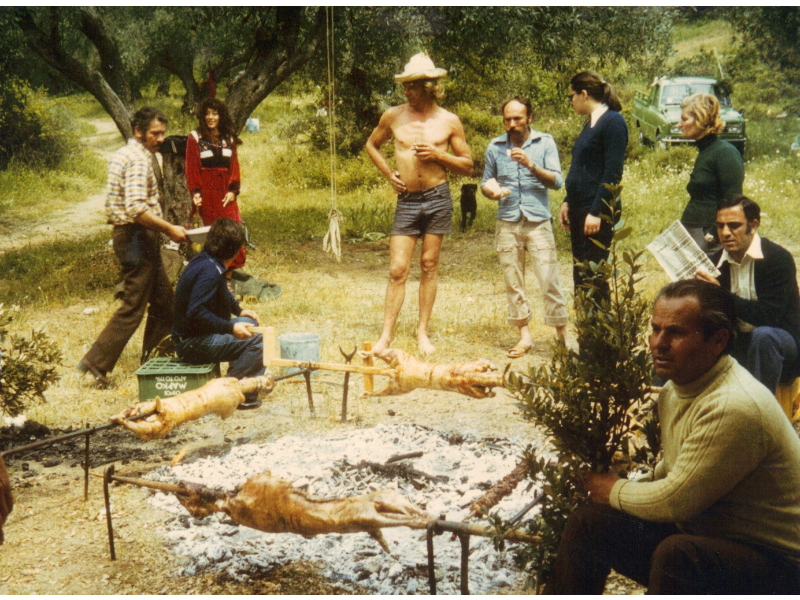
Franz at Vasilia Beach with Lida in the background.
The house cat was a young male called Kippen by Keith who had a wonderfully
dyslexic way of naming things or people that seemed to hit the nail on the head.
Kippen was not the brightest of cats and proved this one day by not noticing
that we had replaced a pane of glass in the door that he used to come in and
out of, cat door fashion. He just jumped up without checking and banged his
head against the new glass. After thinking about it for a bit, he must have
come to the conclusion that he had got the wrong side of the door and promptly
jumped up and hit his head against the pane of glass next to the first one.
We were rolling on the floor with laughter and it took us quite a time to get
back to some serious work. Kippen, meanwhile, gave up and stomped off in a huff.
(The following winter, Kippen came to stay with me in a kalivi and once crept
so close to the fire embers to sleep that he managed to singe himself and leapt
out of the kalivi window yowling with pain!)
Keith came down and looked at the car and with a few taps of a hammer and a
turn or two with a spanner, freed the starter motor. To celebrate, we drove
to the far end of the island to Aghia Eleni Beach where I promptly drove the
car off the end of the road and into the sand. It took us several hours, a lot
of brushwood and a huge amount of serious swearing to get it out again and I
began to wonder if Keith thought I was as big a dick head as I was feeling.
He never told me and I never asked!
Keith introduced me to Jim who was villa sitting and had access to hot water,
a shower, and a bath, and was frequently visited by kalivi dwellers in need
of a monthly scrub. I also met Reese and Patty, the American couple who lived
in a tiny kalivi further back in the woods from Keith’s. Patty greeted
me with the rather disparaging comment of being “the boy with the list”,
but they turned out to be a friendly and interesting couple who acted as the
mainstay of the kalivi crowd. Patty had money and they had bought their kalivi
and the land around it. However, they lived a very simple vegetarian life, spoke
a fair amount of Greek and looked as if they had been there forever. I was a
bit overawed by Reese who, with his long hair and beard, wise eyes and slow
American drawl, seemed like some kind of guru.
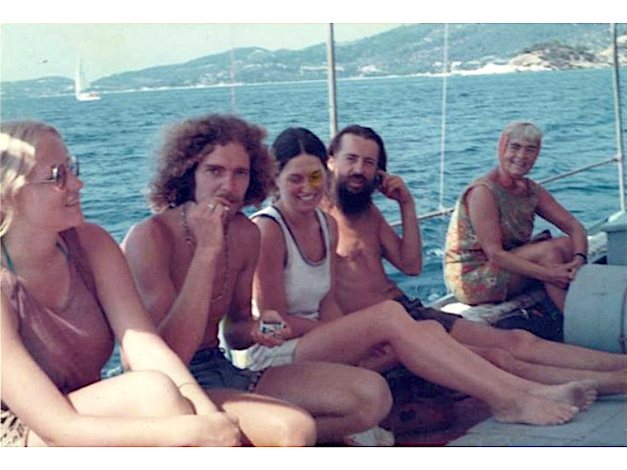
Annette, Geof, Patti, Reese, & Reese's mother, Bess
Keith, Paula and I celebrated my 24th birthday in Skiathos Town where they
showed me a couple of the local tavernas both of which still exist today; Stamati’s
and Messogio. We ate and drank copiously (in fact I got pretty drunk which does
not happen to me often). The food was great and the wine was wonderful and it
cost all of 30 Drachmas per head. At this time a US dollar was worth just about
that amount and I just couldn’t believe how cheap the night had been.
Keith and I also spent several afternoons at an ouzeri (where the Oasis bar
and café now is) under the shade of a massive plane tree, watching the
comings and goings, drinking karafakis of tsiporo and snacking on the mezedes
that came with them. A karafaki was about 4 small shots of tsiporo (like ouzo
but purer, in theory,) and each one came with a substantial plate of little
fried fish, calamares, fried courgette or aubergine slices, or dips of skorthalia,
tsatsiki, or taramasalata. Each karafaki with its plate of mezedes cost just
17 Drachmas so with 51 Drachmas, we were feeling very merry and full of goodies
to boot.
We had formed a pretty close friendship by then although I was still the “new
boy” on the island and someone often viewed with not a little suspicion
as “the one with the list”. You have to remember that this was still
the time of the Colonel’s Junta dictatorship and many people were afraid
of just disappearing. The CIA was reckoned to be mixed up in all kinds of skulduggery
and this (apparently innocuous) person (me) with a list of names was perhaps
not all he might seem.
I eventually met everyone whose name Gabi had given me and they all became close
friends and/or people who influenced me in many positive ways. Looking back
on that evening in Freiburg, I realise now that fate had intended me for Skiathos
although I was completely oblivious to it at the time.
Reese and Patti had two horses called “The Bay” and “The Brown”,
after their colouring, and were busy planning and building a stable for the
animals. The stable was about three times the size of their own living quarters
in the kalivi but the horses were also about three times as big! Patti had money
from her parents and Reese was a hippie from way back and a fascinating man.
With the help of Franz, (who could build the Acropolis in a few days if he put
his mind to it) the stable was built in the course of a few Sunday’s work.
A "work party” would be set up to pour the foundations (for example),
followed by wine and food and a celebration of achieving something solid. This
became a pattern for several building projects (including our own first house)
and is a wonderful way to get a lot done in a day and have fun at the same time.
This was also my first experience with seriously hard work. Mixing concrete
by hand and then humping it up ladders to pour a ring beam was something I had
never encountered before. I loved it and even looked at the (painful) blisters
on my hands with pride.
Still, time had progressed, Franz was ready to let his apartments out and I
thought that, nice as Skiathos was, it really was time to think about moving
on. However, one day, Keith mentioned that an English lady called Betsy who
had a kalivi on the north side of the island and had lots of animals that needed
looking after while she returned to England for a couple of months, was desperately
looking for someone to “kalivi sit” and keep the animals alive whilst
she was away. It was a free roof and perhaps an interesting experience, he told
me. So we went to see Betsy.
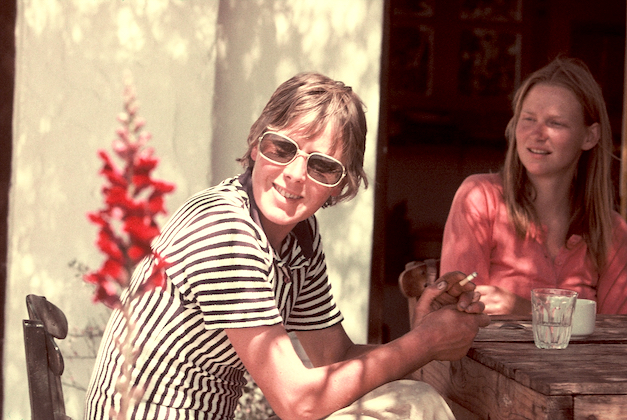
Betsy & Paula
She was an eccentric Englishwoman who spent half her time in England and half on the island. With the rent from her house in London, she could live comfortably, if parsimoniously, in Greece, and her excuse for doing so was that she was writing a history of the island. She kept chickens, rabbits, cats, a dog and a donkey. The donkey was necessary as her kalivi was 45 minutes brisk walk from the village or 25 from the nearest road. Keith took me up by a “short-cut”, a path that disappeared into nothing but scrub and I was introduced to the delights of thrashing around in the undergrowth, brushing spider’s webs (and spiders!) off my face. We eventually found Betsy’s, which was a conurbation of one-room kalivis, some joined to each other, others separate, with an incredible view across the sea to the neighbouring island of Skopelos. Betsy showed me around the place and told me of the chores. Apart from looking after the animals (and trying to stop them becoming constantly pregnant), there was a newly planted vineyard that needed watering through its first summer.
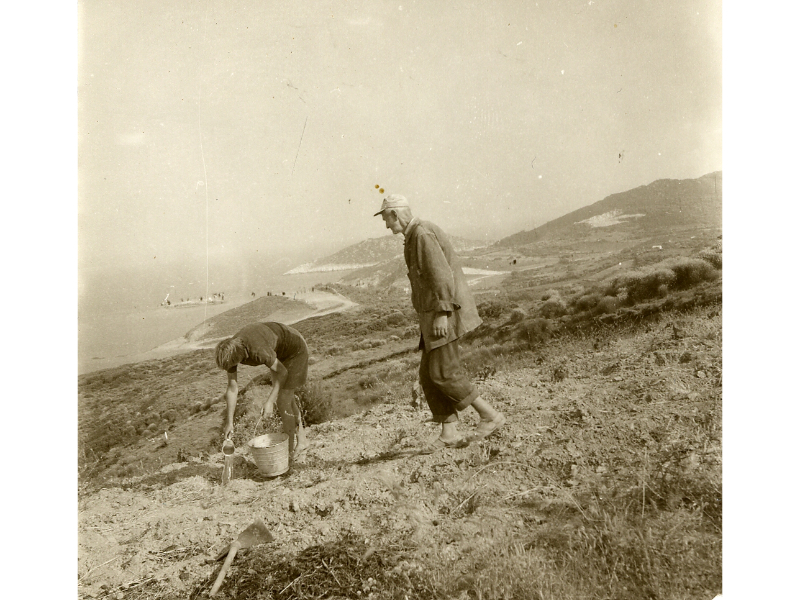
Betsy & Thanasis watering the vineyard
The situation was however, magic, and with little reflection I agreed to stay
until September. Betsy left after a week having shown me how everything worked
and from which nearby springs (and not so nearby) drinking water was available.
I found out that, although Betsy was a fascinating person who had seen the island
before any development had started, she was not an easy person to live with,
and I was happier once she had left and the farm was all my own to manage as
best as I could.
Before she left, but was in Town shopping, 2 tearful children suddenly came
running up from a kalivi below, just next to the end of the airport. They were
calling for Betsy, but I managed to tell them that she was not there. They then
pleaded with me and more or less dragged me down to their kalivi. I didn't understand
what was going on but they obviously needed help. It turned out that one of
their younger brothers had been kicked in the head by their mule and the father
was carrying him to Town to the Health Center, some 4 kilometers away. I jumped
into my VW and picked them up and drove them to the Health Center. The boy,
Georgos, was OK after being bandaged up, but my reputation as someone who would
help, was made :-) Another of the brothers now helps me put my boat mooring
in every year, and his wife is the secretary to my accountant. We go out for
tsiporo at least once a year and the story gets told anew.
I slowly got into the routine of Betsy’s and Greek peasant life in general.
Every morning was feeding and cleaning out the chickens and the rabbits, dragging
the donkey out of her shed to a bit of grazing, and pumping some water for the
vineyard. There was a large water tank with a concrete collection apron around
it, where the winter rains were gathered for summer use. This was then hand
pumped to a couple of 50 gallon barrels for distribution by bucket to each vine.
There were13 rows of grapevines that needed watering once a fortnight. The water
in the reservoir on her land was scarce and precious. I had to pump it by hand
into the 2 barrels by the vineyard and then take it by bucket to each vine and
measure out 4 kilos, no more, no less. (The Greeks do most things by weight
so it was kilos of water, not litres, and one still orders wine from the barrel
in this way.) The reservoir looked out over the airport, Xanemos Beach, Cape
Kefala and Skopelos and every morning and evening I spent roughly half an hour
pumping and meditating (you could call it) whilst enjoying one of the finest
views in the world. I did one row per day and on the 14th day I (the god of
the vineyard) had a day of rest. It was the day that I would go down the mountain
(as I thought of it then) and visit my friends.
Living very much alone (except for the animals) and just going to town once
a week for supplies and once every other week to visit, threw me very much back
into myself, and I had the time to have a good look at my life and evaluate
just what (if anything) I wanted to do with it. Up to this time I had drifted
along. I had given up working with computers and all other kinds of “normal”
work, as it just didn’t seem to be satisfying in any meaningful sense.
Having the small financial freedom of my inheritance and the massive spiritual
(if you like) freedom that I found at Betsy’s started me thinking that
I had found some way of life that really suited me. It gave me the freedom from
social mores (and the British “class” system) that I had always
craved, and (as a foreigner) gave me the freedom to just “be myself”
without fitting into anyone’s preconceptions of who I should be. The fact
that Skiathos was (and still is) to me, a paradise, also helped me to start
thinking seriously about taking what little capital I had and, instead of blowing
it on a round the world trip (which would still have been a great education),
investing it in a piece of land and trying to live here. All this evolved over
the months I spent at Betsy’s and I shall always be grateful for the wonderful
time I spent there, and Betsy’s, albeit unwitting, influence. I had learnt
how to load a donkey (or in fact any four legged beast of burden), make water
stretch a looonnng way, grow things, care for animals, care for myself (!),
not rely on so called civilization but more upon myself and friends and, in
short, discover my own worth and value as a human being.
Living virtually on my own with only Greeks as neighbours, I needed to rapidly
learn Greek so that I could understand what they were saying to me (and if it
was nice or not!). Greeks are extremely hospitable to strangers (it can change
later as the friendship becomes real, or remains just superficial) and everyone
I met was very helpful and friendly. They were also curious as to why this long-haired
“freak” was living in the same way as they did, when everyone knew
that foreigners were all rich and could eat off gold plates. Betsy, by then,
was accepted as a “local” but still a bit of a weirdo, but I was
seriously outrageous looking and this was something to be discussed, mulled
over and researched by devious means, mostly alcoholic. I had many conversations
whereby I would point at something and say, “glass” to which they
would say, “potiri” and then, “wine” to which they would
reply, “retsina” or “krassi” and then we would toast
each other, fall off the chairs and I would discover the word for “drunk”,
“methismeno”. Having learned “potiri”, they then delighted
in confusing me by saying “krassopotiro” (wine glass), “ouzopotiro”
(ouzo glass), “neropotiro” (water glass), etc. I discovered that
there are at least three different words for the almost everything and they
would use one of the ones I didn’t know just to stoke me up. The Skiathitees
have their own dialect that tends to cut the end off words so that, whenever
I went to Athens and proudly tried out my newly learned Greek on a shopkeeper
or hotel owner, they would look at me blankly and reply in German!
Greeks are also very tactile (there are no really world famous Greek painters,
except the one who went to live in Spain, but their statues are amazing) and
they “speak” with their hands and bodies. If you are observant (as
I like to think I am) you can understand so much of their conversation by watching
as well as listening. My Greek is still not as good as it should be after all
these years but I can often understand a long-range conversation that I cannot
hear.
During this summer I wrote to many friends and acquaintances to tell them about
“my paradise” and to invite them to come and stay, as there was
enough room at Betsy’s for a few guests. Of all the people I contacted
only Annette and my parents, Jim & Eve, came to see me.
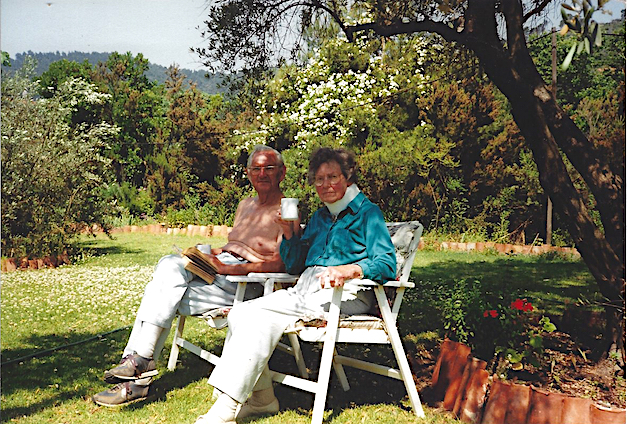
Jim & Eve (quite many years later)
Annette and I sorted ourselves and relationship out (but not without a little
more heartbreak on my side) and that helped to clarify for me that the idea
of staying in Skiathos was definitely better than returning to “normal”
life. My parents (who I think had rather despaired of me ever settling down
or “coming to anything”) came to see just what I was raving on about.
They realised that this was something I was very serious about and gave me support
and encouragement (even though I think that this was extremely hard for them
to do so). They subsequently spent many holidays with us and their grandchildren
here and I am sure they were glad not to have tried to dissuade me.
I also met many interesting and wonderful people in that first summer. People
like Irini a beautiful, young Greek lady who had just qualified as an architect
and was building a villa for her parents on the Kalamaki Penninsular.
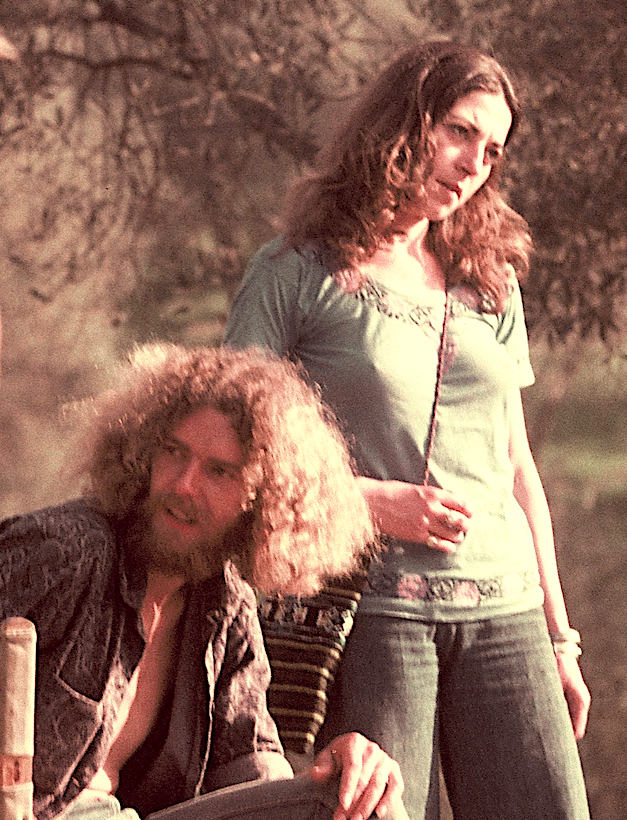
Geof & Irini at Reese's
She had been coming to Skiathos every year since she was a young girl and is
still coming to this day. She was having a fling with “American”
Jeff, a friend of Keith’s who also stayed that summer. I well remember
a party at Jeff’s kalivi when Franz who, having been born in the desert
in South Africa and could smell rain two days away, led us all in a rain dance
around the olive trees by moonlight. In fact, Franz used to make money by betting
with the Greeks (they love a gamble) that rain would come in two days time and
he was right nearly all the time.
My friendship with Keith and Paula deepened and I came to admire and like Reese
and Patti immensely. Many travellers passed through and left both good and bad
memories but always more experiences to add to my “new” life.
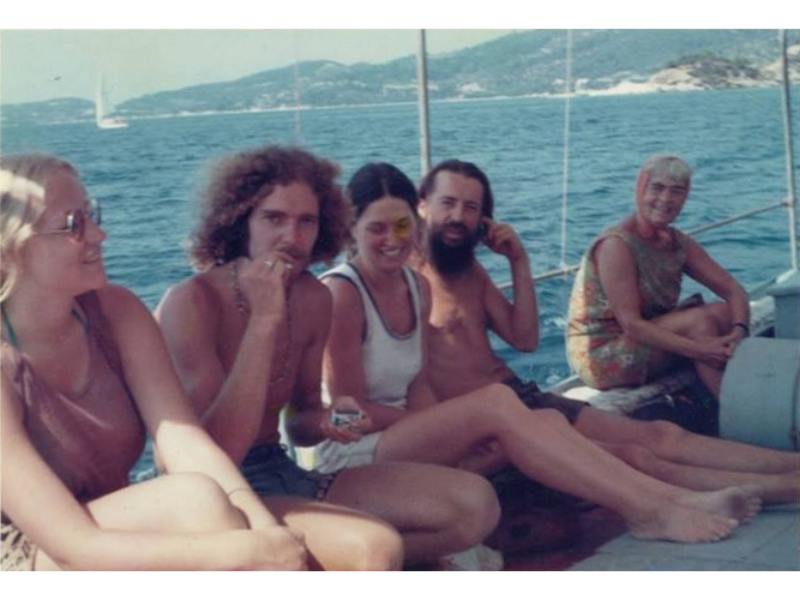
(from the left) Annette, me, Patti, Reese and Reese's mother, Bess
I met a (slightly eccentric, if not “mad”) German psychiatrist,
Hannes, and his wife Heidi who was a well known German actress and quite beautiful.
The day we met, I am sure Hannes was on something (probably acid) as he was
describing a film he wanted to make but the story line just rambled from one
crazy scene to another. I went with them some days later to see a piece of land
in Alonissos that was for sale and I liked their company a lot although his
ideas were weird to extreme about all aspects of life. I was open to listening
to anyone and their opinion at that time, trying to soak up as much “life”
as possible.
Other notable meetings were with Babis, who was building Irini’s villa
and eventually first showed me Zorbathes. His mother Areti (also the mother
of Stathis, of taverna fame), who had had 9 children and still looked after
one who was a bit “soft in the head” even though she was by then
well over 70. She made the most wonderful tyropittas (country cheese pies) with
eggs, milk, home made feta cheese, pastry rolled out to paper thinness, and
a cheerfulness that belied her hard life and added to their flavour. Stathis
still makes these (but only for friends) and they are just as delicious. She
could remember growing up in Kastro, the old town of Skiathos, and how, when
they moved, they took the doors, windows and roofing materials along to make
their new houses. This is one reason why Kastro looks so desolate with just
ruined walls standing.
I used to get drinking water from a spring below her kalivi, which welled up
inside the bole of a large plane tree. I loaded the donkey, called “Donk”,
with various metal and plastic containers to fill with water and trundled down
to the tree. Areti would hail me and I would tie up Donk and sit down for a
cup of Greek coffee (actually Turkish but never mention that!), a piece of pie
and a chat in my broken Greek and her descriptive hands.
The whole pace of life was just so different from “so called” civilization,
and all the hurry, stress, drinking and drugs that compensate for the lack of
the “real” civilized society which I definitely thought I had found
in Greece. Needless to say, Greece has been rushing to join the first type of
life with its seeming economic benefits but has lost a fair amount of her soul
in the process…you don’t get something for nothing! I found myself
changing from a confused, often doped, child of the middle class suburbs in
which I grew up, to someone who cared for other people, cared for some deeper
values than simply material ones, and generally felt almost completely at peace
with myself and what I was doing.
It’s about time that I described Skiathos a little. It is a relatively
small island, tucked in the lee of the Pelion Peninsular and not subject to
the same strong winds that howl down the Aegean and through the Cyclades islands
for most of the summer. The prevailing wind is northeast and rarely blows more
than 4 on the Beaufort scale. Ideal for sailing! Skiathos is blessed with fertile
land, lush green forests and many sandy beaches. There are at least 18 long
beaches with beautiful sand plus another 40 or so smaller sandy beaches. There
are also 4 large pebble beaches including the famous Lalaria Beach with its
smoothed pebbles and crystal clear water. When I arrived, there was only 1 tarmac
road from Skiathos Town to Koukounaries Beach plus the mud road leading to the
monastery of Kounistra and the beach of Aselinos. Everywhere else was accessed
by foot or animal and these paths were beautiful. The main ones, like the one
from town to Kastro had been laid with large cobblestones for their whole length
and had been worn smooth by the constant tread of hoof and shoe. It took around
3 hours to get to Kastro on this road and it passed fairly close to the highest
point of the island at 433 metres. In olive picking years (every second year),
people would set out at 3 o’ clock in the morning to be at their land
at Kastro or Kechria so that they could start picking the olives at first light.
They would stay for several days in tiny kalivis whilst sacks of olives were
carried back by animal to the olive press situated in Skiathos. I loved walking
these old trails and we often took picnics with us and went off for the day
to some remote part of the island. Skiathos seems to have so many different
facets to it. In many places, there are mini-climates and one half of the island
is definitely different from the other. This seems to be geological as the eastern
half has more granite in it and the western half is mostly sandstone. The olive
trees on the eastern half grow better and produce more oil per kilo of olives
than those towards the western end. It is often the case, when we have thunderstorms
that it will pour down with rain on one half of the island and there will be
virtually nothing on the other half. The dividing line seems to run from the
Kalamaki Peninsular through to the Kechria Valley.
There was very little tourism then. It was mostly Greek people who would come
in July and August and for the rest of the time, Skiathos Town was a sleepy
little fishing port. When the ferry came in, once a day, it was a big event
and half the locals would go down to see what was happening and who, if anyone,
was arriving.
The foreigners living on the island were split into two groups. The “villa
owners” who had bought villas on the Kalamaki Peninsular and the south
side of the island, and the “kalivi dwellers” like myself who were
mostly hippies, travellers or odd eccentrics of one sort or another. (In the
late 60’s a South African man saw the potential of Skiathos’ beauty
and started buying up plots of land on the Kalamaki peninsular, mostly around
Kanapitsa Bay. He offered a plot for £2,000 and a plot complete with villa
for £4,000! Although this was quite a bit of money in those days, the
villas were still bargains and are now worth many, many times their original
purchase price.) Mostly the first groups were British with a few Germans, Greeks
and a couple of other odd nationalities as well. They were well off, or rich
retirees, or remittance men. The kalivi dwellers were largely struggling to
make ends meet so that they could continue to live in this wonderful place.
The one group was often a source of income for the other and, although there
were some “class” divides and, obviously, economic ones, we were
all foreigners here (even the non-Skiathitee Greeks were “foreigners”!)
and therefore held that in common. The locals were, on the whole, very friendly
and hospitable and were always encouraging whenever I tried to make myself understood
in my (very) basic Greek.
The beaches were mostly empty except for Koukounaries, which was then an umbrella
free, long, fine sandy beach with lovely Koukounaries (stone pines) behind it,
where one could relax in the shade. It had a taverna, as did Troulos Beach and
Kanapitsa Beach. All the other beaches were more or less deserted. Vromolimnos
Beach (for example) was covered in driftwood and rubbish from the sea and no
one would ever think of going there. We would get quite put out if we saw someone
else on our favourite beach of Platanias (now often known as Aghia Paraskevi
Beach) even though they might be sitting some 400 metres away from us!
When Gabi told me about Skiathos, I had envisaged a small Greek cottage by the
sea where all these friends of hers stayed. I actually saw a cottage exactly
like that when I went to live at Betsy’s but it was right at the end of
the airport and the owners (the people whose boy had been kicked in the head
by a mule) had been moved out. It looked very sad. The airport had just been
finished when I came. It had used (and put tarmac over) the best land in Skiathos
where everyone used to grow their crops and vegetables and grapes for wine.
This is not an unusual situation. Heathrow Airport (which I grew up very close
to) is reputedly built on top of 18 foot of prime Thames Valley topsoil. The
airport had broken the hearts of many of the old boys who had lived on that
land all their lives, raised their children there and grown their gardens and
vines, and although they received compensation (not much, I fear) many of them
faded away and died in the next few years. It has been a mixed blessing. Whilst
bringing the wealth that came with tourism, it was also the first step in the
erosion of a wonderful lifestyle that had not changed much for many centuries.
There were few fences. Land was defined by natural borders or stones set upright
at strategic corners. A person would identify his land as going from this corner
stone to that stone, along this streambed, up to the hedge and back to the corner
stone. This olive tree was inside but that one belonged to the neighbour, and
so forth. What fencing that existed, was usually around a kalivi to keep the
animals OUT and away from the garden. Chickens, goats, rabbits, etc. often roamed
free, particularly up in the hinterlands where the goat herders lived and the
nearest neighbour was a long way away. There were disputes about borders, of
course, and accusations of neighbours moving border stones were rife. There
was an incident I heard of (I believe it is true) where three brothers were
dividing up land inherited from their father and the dispute over the ownership
of one olive tree became so heated that eventually one brother held a second
whilst the third brother stabbed him to death! A “passionate” killing
like this was considered far less grave than premeditated murder and, often,
the sentence would be lighter than given to someone dealing in hashish, for
example.
Many, many years ago, long before I came, there were no written records of land
ownership and transactions. One family was the “records office”
and kept everything in their heads and this knowledge was passed down from father
to son. One assumes that this family must have been honourable otherwise the
opportunities for corruption would have been rife.
The town of Skiathos was built on two hills that overlooked the harbour. In
between the two was a streambed which had some water most of the year but which
had been covered by the time I arrived and turned into the street of Papadiamantis.
We still affectionately know this street as “the main drain”. At
the end of this street, next to what was the police station, were two massive
plane trees that provided lovely, deep shade. After the police station moved
there, for some reason, one was completely cut down and the other trimmed back
to a bare shadow (sic) of itself. Now, the tourist shops in that area have had
to put in air conditioning to keep them cool (which consumes energy and pumps
out more heat into the atmosphere)! The high school was there but in much older
buildings that nowadays. The junior school was on the Bourtzi and there were
not enough teachers to go around so some children went in the morning and some
in the afternoon. The town council had recently put on a causeway to the Bourtzi
so that the kids didn’t have to scramble across the rocks (and sometimes
get wet) on their way to school. Traditionally, all the youngsters had their
hair clipped very short in spring and I (who had been happy to get away from
“skinheads” and the like) found it a bit of a shame. At the beginning
of each summer, they were brought down to the harbour and, in front of the main
outlet from Papadiamanti Street; they all jumped in and paddled around happily
(something I would not recommend now!).
A small amount of people were making money from tourism and working for the
villa owners but most people still lived from the land, the sea, or received
money sent back from the local men working on the Greek ships all over the world.
Every morning, a line of horses, mules and donkeys would set out from the village
towards Koukounaries which would gradually get less as each rider peeled off
down some trail or other to get to his olive grove or small plot. Often the
animals would be loaded with 2 sacks of their own manure, scraped up from the
stable floor and destined for a couple of olive trees or a garden patch. Distances
were measured in cigarettes, i.e. “How far is to Kolios?” “About
2 cigarettes”. The old trails were kept open by a swipe of a machete from
horseback if some branch or twig became long enough to be bothersome. They would
return in the evening with their animal loaded with olive prunings for a goat
or lamb that was kept somewhere near the village.
A word or two here about the olive tree. Olives and olive oil has been the staple
of the Greek diet for centuries (you could follow the path of the army of Alexander
the Great through Asia by the olive trees that grew from the pips dropped by
the wayside). Both are full of goodness and olive oil is reckoned to be the
healthiest of oils. Visitors to Greece that think a dish of food that has a
lot of oil in it is “greasy” and likely to upset their stomach are
making a dreadful mistake! However, the olive tree not only provides good food
but also gives wood for heating (it burns long, beautifully and gives good coals
for cooking) and the leaves are a good source of nourishment for goats, sheep
mules, donkeys, etc. The trees provide shade for a midday nap and food for the
eye because the colours of the leaves are constantly changing as they rustle
in the breeze. An artist friend once told me that it s impossible to paint an
olive trees true colours on canvas because they never stay the same.
Olive trees will grow in places that most other trees would die in and will
cling to seemingly infertile, rocky areas, and thrive. They do need attention
but, with a minimum amount of fertilizer and a regular pruning, will produce
a crop of beautiful olives and golden oil. As the olives mature, from September
onwards, they turn from green, through purple to a deep black colour. At any
stage of maturation, if you pick and polish an olive on your shirt (much as
one polishes a apple), you will be rewarded by a glowing jewel as the natural
oil burnishes the skin. The trees have a natural two-year cycle and so every
other year is an “olive” year and the olive presses are spruced
up and repaired ready for the harvest. Even here, the olive proves generous
to the last. After the virgin pressing in the local presses, the left over semi
dry slurry (pyrini) is taken away by lorries to the mainland to large, commercial
presses which squeeze quite a bit more oil out. These same lorries bring back
the (now almost dry) pyrini to the local presses where it is burnt to produce
the hot water necessary to clean the oil after pressing.
Fishing was the other main industry and there were far more fishing boats then
than there are now. In the evening the “gris gris” boats, consisting
of one mother caique towing lots of smaller boats each equipped with acetylene
lights, would fire up their old diesel engines. They poured a bit of oil into
the air intake to increase the compression and then with a hefty swing on the
handle and a few smoke rings out of the exhaust, they would start with a “wump,
wump wump”. The mother boat would ease slowly out of the harbour and ropes
were thrown from it to the first small boat, then from that to the second, and
so on, until there was a string of boats progressing out to sea as the light
started to dim. There would be the odd spot of cursing and piss taking if someone
failed to catch his rope as the boats went passed. They would return at daybreak
and unload their night’s harvest at the fish market where eager locals
would crowd around, pushing and shoving to get the best of the catch. (Queuing
is an unknown phenomenon in Greece.) Smaller fishing boats would come and go
and often sell the few kilos of fish straight off the boat. There were also
one or two larger trawlers that would stay away for several days. A lot of their
catch would be sent off to the mainland packed in ice once the best fish had
been selected for local consumption.
The stretch of the waterfront from the plane tree (where Keith and I consumed
our tsiporos) to the fish market was where the fishing boats were moored. It
was not wide enough to accommodate shops and had a small “park”
and a few benches that were shaded by leafy trees in the summer but warmed by
the sun in winter. This was a favourite spot for the “old boys”
to sit, leaning on a stick (bastooni) and flicking some worry beads (komboloi)
back and forth in complicated patterns and rhythms. They would exchange gossip,
josh “youngsters” (60 or less) walking down to buy some fish, or
just sit watching the boats bobbing up and down next to the quay. In the winter,
it was a place to soak some of the sun’s warmth into old bones and doze
off for a while. I found myself contemplating old age (and its inevitability)
and thinking to myself that here would not be a bad place to get old in.
Just along from these benches were the public toilets, a place you would have
had to pretty desperate to contemplate approaching.
The fishermen spread their nets out on this part of the waterfront and sat on
the ground mending their nets with one gnarled big toe poked into the net to
stretch it out for sowing. They were always barefoot and usually had a cigarette
smouldering in one corner of their mouths as they worked.
From the fish market, steps led up to a maze of narrow streets that eventually
led to the top of the west hill where the Health Centre is located. This was,
and still is, the nicest and most authentic part of town. The narrow streets
do not allow much major building so the old houses remain pretty much as they
were and many have been renovated beautifully. Those close to the cliffs above
the sea have wonderful views over the harbour to the Bourtzi and beyond.
In the town (well, it was a village then) the men played cards and drank coffee
or ouzo in the kafenions and discussed, often in raised tones, the day’s
happenings. Greeks, from a foreign perspective, always seem to be very loud
and having arguments but we should remember that “drama” is a Greek
word and an event that has no dramatic appeal, or cannot be dramatized in the
telling, is not worth discussing. The purchase of a piece of “worthless”
land for a hotel in Koukounaries could be passed over in favour of a heated
discussion as to whether the saddle maker was justified in raising his prices,
or was he ripping everybody off (again!). The women sat outside their houses
and gossiped about this or that but, I believe, secretly ran the whole society
whilst the men, who seemingly ruled the roost, were actually given only so much
rope!
In the main street, opposite what was then the Post Office, was the “workers”
Kafenion. It was like kafenions you used to find all over Greece, with many
small, marble topped tables, each with 4 chairs, packed into the minimum of
space. Here the workers and haulage men used to wait for anyone needing their
services, drinking an early morning “cognac” (really cheap brandy)
and swapping stories and discussing anything from lack of work and politics,
to football scores and the latest local scandal. There was usually a “character”
(often well oiled with cognac or tsiporo) that would keep the company in stitches
with stories and antics. In the evening it became their local “Ouzeri”
where carafes of ouzo and tsiporo were consumed with the small plates of grilled
fish, octopus, baked potatoes and anchovies that prevented the alcohol from
getting too much into the blood stream. The small plates of food (mezedes) were
left on the table as they piled up, and when the bill was eventually called
for, the proprietor simply counted the number of plates to calculate the cost.
Work for the following day was often arranged during the course of the evening.
Many foreigners complain about the size (or lack of it) of ouzeri and kafenion
chairs. They are uncomfortable to sit on for a long time but not if you use
them as the Greeks do. You need three (3!) chairs to sit on. One you actually
rest your bottom on, another in front of you for one foot and one to the side
of you for your arm! This is remarkably comfortable. Of course this no longer
becomes tenable as the room fills up but by then you normally have good “parea”
(company) and a few small drinks under the belt and you cease to notice the
chairs at all. The Kafenion was pretty much a male bastion. Women were allowed
but frowned upon and Lida never felt totally comfortable there. It eventually
closed down as the rent became too high for a small local business and it is
now a shop selling gold and silver jewellery. A real shame as it was another
part of the “old” Skiathos that I love and miss. There are still
a couple of similar places in the back streets that only the locals use but
they don’t really have the same atmosphere of that original one.
The women always greeted me pleasantly as I walked past and it was not difficult
to smile at everyone I met. Only one of the priests would not say hello to me
and avoided my eyes. I guess he felt that long hair and a beard was his prerogative
and he resented me wearing both. I finally received his acknowledgment, many
years later, when he wanted to buy some of the organic green beans that I was
then selling in the town, and after that, he was OK. I was always careful to
give the people of Skiathos their due and respect and found that it was then
returned to me. It seemed that, the more I liked Skiathos, the more it liked
me.
The big social occasions were the religious festivals when the islanders would
gather at this or that church, some inside participating in the service but
many outside with a flagon of home made wine and a picnic, thoroughly enjoying
a party. There is a commemorative headstone in the churchyard of Agios Yiannis
Prodromos (John the Baptist) close to Kastro, which states that 4 people were
struck by lightening on that spot and died. One wonders if they were having
too much fun outside whilst the service was going on? Marriages and christenings
also afforded an excuse for a good time and name days were celebrated by the
person whose day it was plus all of his family (which didn’t leave many
people to do any work, so most didn’t!)
Easter is THE Greek holiday. It is usually preceded by 40 days of fasting when
meat is definitely proscribed and even olive oil(!) must not be eaten on certain
days. Most people in Skiathos did some kind of fasting, some sticking absolutely
to the letter of the Church law whilst others didn’t eat meat but did
eat everything else. Services are held every day for the last week leading up
to Easter Sunday, the biggest of these being on Good Friday night when the “Epitafio”
(bier) of Christ is carried around the Monastery of Evangelistra with a huge
crowd following. Tradition says that it always rains that night as God weeps
for his son. Surprisingly enough, it often does. On Saturday night, there is
a big service in the main church of Tries Iearachis (the lower of the two in
town) and everyone gathers there to welcome the coming of the light as Christ
is resurrected. Towards the end of the service, the priest chants “Christos
Anesti” (Christ has risen) and lights a candle from the one candle that
was burning all through the service. The worshippers then light their own candles
from this one and pass the flame on to their neighbours. The light spreads throughout
the church and then into and through the church square and is really a marvelous
sight. Everyone shakes hands or kisses and repeats “Christos Anesti”
as they pass the flame on. The candles are carefully shielded as everyone walks
back to their houses and then a cross is described in black smoke from the candle
above the doorway to bless the house for the following year. Those that live
out of town will be seen driving home with the inside of their cars lit up by
the candles. A traditional meal of “Mayeritsa” is used to break
the fast after the service. This is a soup made from the intestines, liver and
heart of the lamb or kid that will be roasted on the Sunday. On Sunday morning
early the men get up early to start the fire to make charcoal for grilling the
lamb or baby goat that is traditional for Easter. Often “Kokkoretsi”
will be made on a smaller side spit and will be eaten as a meze to keep hunger
at bay as the main meal will always take many hours to be ready. Kokkoretsi
is all the internal offal (liver, lungs, spleen, kidneys, etc. from the lamb
or kid) threaded in small pieces on a small spit and then wrapped in the small
intestine of the animal. This may sound disgusting to some but it is in fact
a delicious starter if you can get over the prejudice against offal and guts.
The animal is spit roasted over the coals and basted with oil, lemon and oregano.

Three lambs roasting and a skewer of Kokkoretsi
This is a long, hot, thirsty job and some will be pretty high on wine or beer by the time their lamb is done. Boiled and coloured Easter eggs are cracked, one on top of the other to see who has the “best” egg (the one that didn’t crack), and then everyone sits down to a huge feast of meat, bread and green salad. The afternoon is often spent repenting!
Betsy returned and I had to think what I should do next. The idea of buying
a small piece of land and living somewhat like Betsy did, had slowly crept into
my head during my stay at her place.
Still, part of me was saying that if I was going to invest in land, I really
should do it in England. After all, that was my real home, wasn’t it?
I decided to go back and look at the possibilities.
I traveled back with Pat and Collette, a lesbian couple who were going as far
as Munich and I stopped there for a couple of days and visited Hannes and Heidi.
Returning to the UK, I discovered just how much I had changed (and how little
it had) and how I could never possibly live back there again. I had seen too
much other beauty, too much good weather, too much hospitality, too much freedom
and too much of my own heart to ever want to return to my land of birth.
I returned to Amsterdam and visited friends there and talked about my previous
summer’s experiences.
I often visited Pax, a Dutch Indonesian who had a flat where many people visited
and crashed and where I had first met Annette. The previous winter I had also
met Adri and Lida (then married) and two of Lida’s sisters, Liesbeth and
Julia. It was Julia who had said to me after I had split up with Annette,”
Nooit vergeten, achter the wolken, schijnt altijd de zon”, which translated
means, “Never forget, behind the clouds, the sun is always shining”,
and it had been this little expression that I had carried with me to Greece
and found to my delight, to be true. I spent quite a bit of time with Adri and
Lida and liked them both immensely. Adri and I had marathon chess games that
often went so deep into the night that Lida could be waking for work before
the game was completely finished and analysed.
At Pax’s I met Walt, a friend of American George, who was interested in
traveling to Greece. As I said I was going back to Skiathos that January, we
agreed to travel together and share expenses. Another old friend, “Canadian”
Chris would come with us and the three of us crept out of Pax’s flat one
afternoon (without saying goodbye, it has always been the hardest thing for
me to do) and drove south towards Germany. When we got to Munich, I got a bad
dose of flu so we stopped at Hannes and Heidi’s house while I recovered.
Chris decided at this point that he really didn’t want to go to Greece
and left to go back to the UK. Heidi and I had a small fling but it wasn’t
anything serious.
Walt and I drove down through Yugoslavia and took the coast road. This was beautiful
in a rugged, barren kind of way but also took forever as the road wound in and
out following the coastline faithfully. The weather was very mild and we even
slept out on a beach one night. At Dubrovnik we started inland to connect with
the main highway at Skopje. This involved going over the mountains and, although
the days were sunny and bright, the nights became seriously cold. We would wake
up I the VW van with frost all over the inside of the van and would have to
light the gas cooker to melt it. Of course it melted all over us and our sleeping
bags just to make life a little more “interesting”. Our first stop
was for coffee and bread at the nearest hostelry which usually consisted of
a big room with a few tables and chairs and a massive wood burning stove, hand
made from an old oil barrel, around which everyone would cluster. Both of us
had long hair and fairly flamboyant clothes and we were looked upon as some
apparition from…who knows where? As we had no Serbian, we did a lot of
smiling and nodding as we were bombarded with questions about (presumably) who
we were and where we were going. It is a very strange feeling not to be able
to speak to other people but I discovered that a smile goes a long way wherever
you are.
We arrived in Greece and I must say, it felt like coming home.
<Back to contents> <Next chapter>